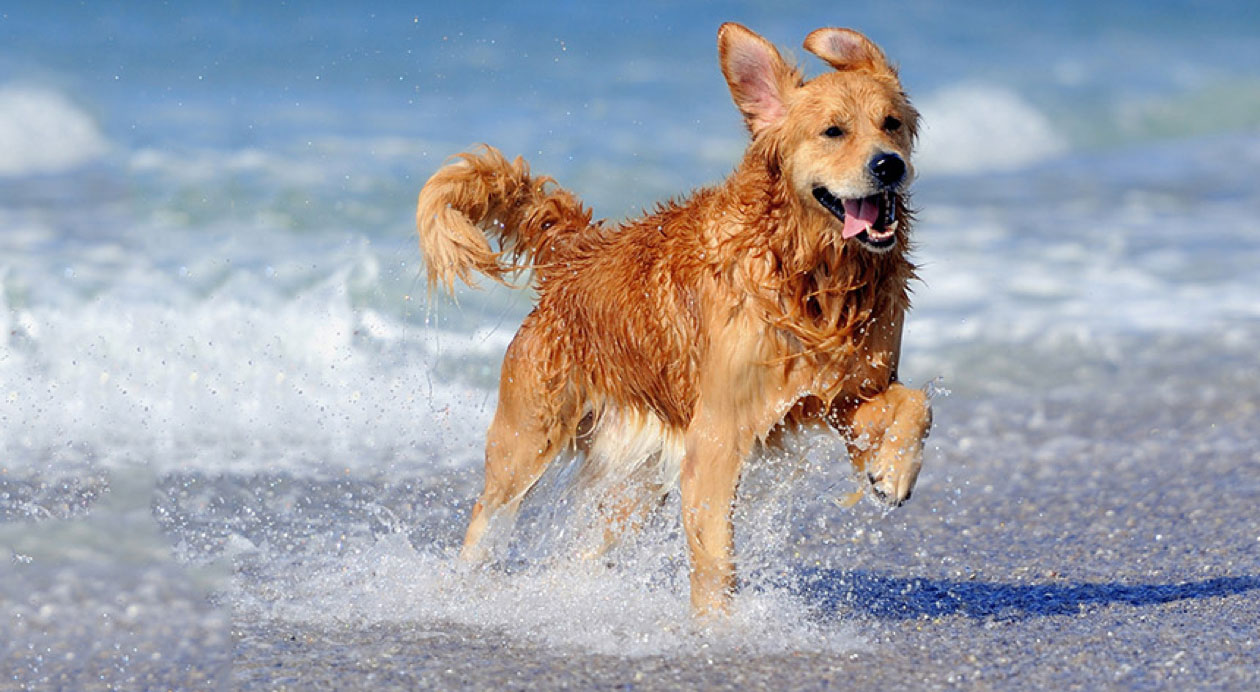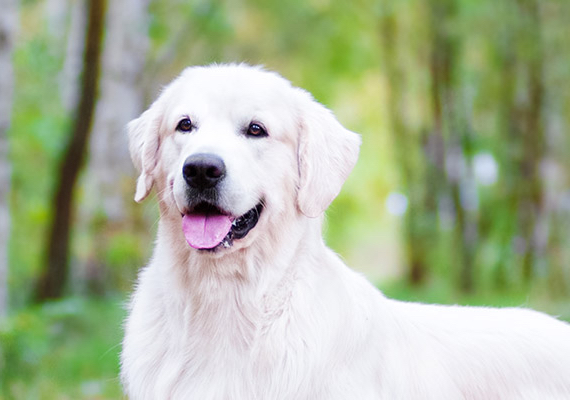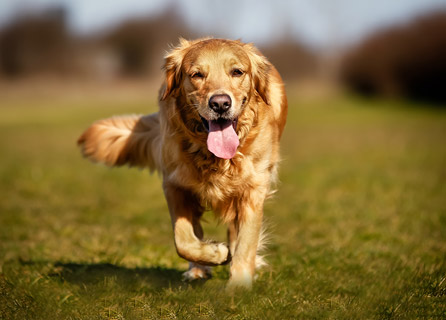
Golden Retriever breed guide
Affectionate, playful and handsome, the Golden Retriever is one of the most popular family dogs. Discover more about this courageous, curious and smart all-rounder, and get tips on a range of topics from exercise, grooming and behaviour, to what you can do to keep your dog healthy and happy.
Breed information and advice
The Golden Retriever belongs to the gun dog group, and while they were originally bred to retrieve game from the hunt they've had many jobs, including being a sniffer dog and therapy dog. They are rarely a fussy eater, easily trained and need a house with a large garden to blow off some of their boundless energy. Here's more you should know:
- Perhaps the one job the Golden Retriever is not suited to is a guard dog, as they're keen to impress just about everyone they meet.Perhaps the one job the Golden Retriever is not suited to is a guard dog, as they're keen to impress just about everyone they meet.
- Their beautiful golden coat is thick and tangles easily, so you’ll need to brush your dog’s coat daily.Their beautiful golden coat is thick and tangles easily, so you’ll need to brush your dog’s coat daily.
- They typically weigh between 25kg and 34kg when fully grown.They typically weigh between 25kg and 34kg when fully grown.
- A healthy Golden Retriever will usually live for 10 to 12 years.A healthy Golden Retriever will usually live for 10 to 12 years.
Typical size of a Golden Retriever: Large: 53cm-61cm

Recommended exercise and nutrition
The Golden Retriever is always bursting with energy and needs more than two hours of exercise each day. Just like the name suggests, they love to bring you things, and you’ll often find them carrying something around in their mouth, such as your shoes. When you're out together, a game of fetch with a ball or stick is the perfect pastime for your companion.
When it comes to mealtimes, feed them a high-quality diet that will give them all the nutrients and energy they need, split over two meals. How much you give them will depend on their age and size, and how much exercise they're getting. Check the food packet for portion recommendations.
More than two hours of exercise per day
Give your dog plenty of exercise each day, including fun games to keep their mind active too.

Common health problems and illnesses
Golden Retrievers need all of the usual vaccinations, flea and tick control, and dental checks to go on to lead a healthy life, but it’s worth being aware of some of the more specific ailments which can affect this breed, so you can look out for any symptoms.
Like many breeds of dogs, Golden Retrievers can develop hip and elbow dysplasia, a painful inflammation of the joints, as they get older. You should look out for any cautious or tender movements in your dog when they get up or lie down, reluctance to play, or lameness. Stiffness or pain will usually ease as they get moving. You may also want to limit your puppy’s playtime on harder surfaces like concrete while they're growing, as this can affect their growing bones and cause disorders in later life. There are many treatments available, ranging from diet and exercise for overweight dogs, to drug therapy for pain.
Ear infections or fleas can cause a build-up of blood to collect in the cartilage of the Golden Retriever’s ear flaps, a condition called aural haematoma. Watch out for signs of this in your dog, such as shaking and scratching of the ear. If you suspect they have this problem, visit your vet who can decide if it will clear up on its own or needs treatment, which usually involves draining away the fluid.
Benign growths such as lipomas, or fatty tumours, are common in this breed and grow beneath the skin - usually upwards and outwards. They're often harmless and appear in older dogs, but they could need removing if they're limiting movement. As part of your dog’s weekly grooming routine, look out for lumps, bumps and other changes in their skin. If you're worried by anything you find - or just want to be sure it’s nothing more serious - your vet can take a closer look and determine the right treatment.
Golden Retrievers are one of the dog breed groups at risk of developing epilepsy, where abnormal electrical activity in the brain causes symptoms such as seizures. If it develops in older dogs, there could be a clear cause such as poisoning, but in some cases the condition is simply genetic or the cause is unknown. Treatments include elimination diets and medication.
When the body doesn’t produce enough of the hormone thyroxine, this is known as hypothyroidism, and is common in larger breeds such as the Golden Retriever. The disease can affect the way food is used to create energy, and signs to be aware of in your dog include lethargy, a dip in mood and hair loss. Typical treatment involves hormone replacement.
Find out about insurance for your Golden Retriever
Learn how pet insurance works and what kind of cover you might need for your dog.
Grooming advice
Because Golden Retrievers tend to shed throughout the year, you’ll need to introduce a regular grooming schedule if you're to keep their coat shiny and healthy. Brush their fur every day to get rid of excess hair, and bathe them at least once a month to make sure they stay looking and smelling clean.
If you hear clicking on the floor, it may be time to clip your Golden Retriever’s nails. Be careful not to clip these too short as you could hit a blood vessel and cause bleeding - a professional groomer will be able to share some tips with you if you aren’t experienced.
It’s a good idea to use a special cleanser to thoroughly clean in and around your dog’s ears - the folds and flaps are ideal breeding grounds for dirt and bacteria, and an infection could develop if left unwashed.
Fun and interesting facts
- The first Golden Retriever can be traced back to the 1860s in the Scottish Highlands.
- Your dog will be white-blonde, yellow or golden - but their other features will depend on whether they are a British, American or Canadian Golden Retriever.
- They're one of the smartest dog breeds, alongside Border Collies, Poodles and German Shepherds.
- They love to go for a swim and are by far the most water-loving of all dogs.
- Famous owners of this breed have included Jackie Chan, Oprah Winfrey and Ryan Reynolds.
Important information
The content on this page aims to offer an informative introduction to pet breeds, but does not constitute expert veterinary advice. If your dog or cat falls ill or has an injury, contact your vet immediately.
All facts and figures were correct at date of publication and were compiled using a range of sources.
Discover more breeds
Browse our other cat and dog guides to learn about some of the UK’s most popular breeds.